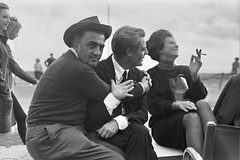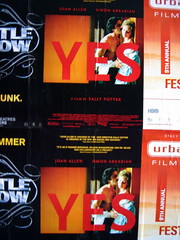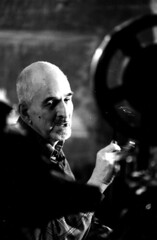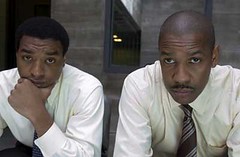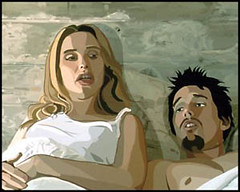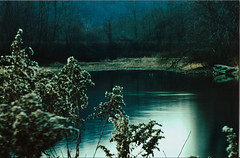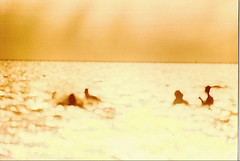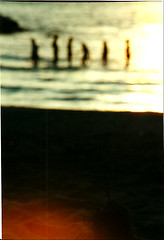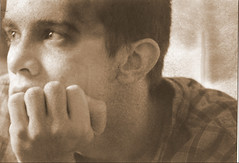8 1/2 (1963)
Dir. Frederico Fellini
Writ. Federico Fellini, Ennio Flaiano (story); Ennio Flaiano , Tullio Pinelli, Federico Fellini, Brunello Rondi
w/ Marcello Mastroianni, Sandra Milo, Claudia Cardinale, Anouk Aimée
Besieged by an undiagnosed but cloying malady, reclusive director Guido Anselmi searches for his film as obstacles emerge in every form imaginable. Frederico Fellini's afterimage labors under heavy dreams, sifts through an ocean of actresses, and collides with his inevitable frailty while meandering, trance-like, through his production. All the while, as clips of conversations make up the frenetic background through which he tunnels, he exists in an alternate dimension which demands more and more from him as he traverses toward a resolution of the personal, revealing, and bizarre. Favoring the journey for the ultimate sake of destination, Fellini often submerges his director in collective, diasporic memories, some that hold stigma, and some that soothe.
Anything going on outside of Guido's mind becomes passé the moment it occurs in his rut. The actresses gather to catch his attention, but few do. Direct conversation means as much as crystal tinkling at a cocktail party, and he avoids it with disinterest, even to the point of talking to a hapless man just to get away. Due to a subtle capturing, a mastery on Fellini's part, it's often hard to distinguish between the reality of the people in Guido's world and the appearance of them in his mind. Often, things don't connect, and characters barrage, picking at the senses until he retreats back into another dimension. Even meetings crucial to the film's progress, such as meeting with the Bishop concerning representing Italy with the rectitude of his film's themes, don't prevail upon him to leave off his musings.
His inner life preoccupies and drives him to distraction, enchants and torments him with its vivid imagery and guilt-laden layers that blight the more salient moments of his childhood. An early introduction to Saraghina, a garish woman who lives in a sea shanty, conveys his first curiosity in the vigorous female form. As the social and moral outcast dances the rhumba for a coin, the boys cheer, but Guido responds in earnest to the prostitute's visceral daring. The Church then chases him down, finds his disgraced mother, and shames him for lewdness.
Fellini doesn't work it to death. His understanding of Guido as halcyon as moonlit tidepools, the director allows him the freedom earned by a lifetime of inner turmoil to do as he pleases, and he phones his lover. When Carla seems to have missed the train, he shrugs with apparent indifference; but the camera with relief, so that her sudden appearance as the train departs declares a man torn between two unknowns. Although her presence helps him get at least one good night's rest, his mental detachment increases with her dense witticisms even as his body responds with a will of its own. His wife Luisa arriving only a little later, though, seems to bring him angst, shoving his thoughts to the outer realms where no one can reach him.
The essential play that Fellini prepares effuses a desire for the world to be lovely and reasonable, as evidenced by Guido's delight that his wife and mistress, once having spotted each other, take to each other with comraderie and style and genuine affability. But do they really treat each other right, or by way of magic has the camera tricked into reality a whim of the director? Like I said, it's hard to say sometimes. In his secret heart, Guido clings to and cherishes his wife, seeing her simplicity and her strength, the quiet calm at the far end of his restless fantasies. Aware of his seeming emotional destitution, he finds solace in that place.
Yet Guido's film plays out as a trite send-up to that emotional destitution, and during a viewing of the actresses' screen tests, Luisa watches the sad parodies of herself and Carla mutilate lines over and over. None of them can ever bring the same simpering gibberish or that certain je ne sais quoi. The screenings project relentlessly, and the only abatement is the arrival of Claudia Cardinale as a facet of herself, his last hope and savior. When she, too, undermines his fantasy notion of her, Guido faces the novelty of a lifetime of imperfection reflected all around him. Things grow dark, perturbing, and gauntly out of reach, the images fragmenting as Fellini hoodwinks his audience one last time, because he can.
Fellini claimed that his seventh film was only half a film, giving this title its only real significance; the picture, on the other hand, is worth far more than a thousand words. It defines and redefines filmmaking, unabashed by real-life problems, and starkly honest at its depths, so much so that it led the Time magazine reviewer in June, 1963 to write, "Fellini has a singular personal problem: why is he so preoccupied with making movies that speak of the emptiness of life?" But had the writer the opportunity to watch this several times and reflect, he very well may have sung an altogether different tune; one of surprises, inspiration, and joy.
